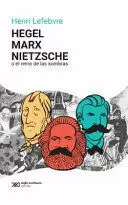
HENRI LEFEBVRE
A partir del estudio de algunos de los conceptos centrales en las obras de Hegel, Marx y Nietzsche (el Estado, lo social y la sociedad, la civilización y los valores, entre otros que dieron forma a la filosofía europea del siglo xix), así como de sus coincidencias y contradicciones más importantes, este libro de Henri Lefebvre acerca al lector de otra manera a un mundo poblado de conflictos polisémicos que no se dejan dominar ni comprender cabalmente desde un solo punto de vista.
En Hegel, Marx, Nietzsche, o el reino de las sombras, Lefebvre lanza una afirmación de paradójica apariencia: el mundo moderno parece ser al mismo tiempo hegeliano, marxista y nietzscheano. Pero ¿cómo es posible esta triple determinación, teniendo en cuenta las enormes y (aparentemente) insalvables diferencias entre las propuestas de dichos autores? ¿Qué clase de "mundo" es ése que responde a las doctrinas más diversas, opuestas en más de un punto, incluso incompatibles? La respuesta que nos ofrece este texto es que las obras de estos autores se han constituido en "ideologías" que planean sobre las prácticas sociales y políticas de nuestro mundo; y cada uno de ellos captó "algo" del mundo moderno, algo que estaba a punto de formarse, y cuyos ecos resuenan hasta hoy.
El carácter abierto y al mismo tiempo analítico de esta obra la convierte en una referencia fundamental, tanto para el lector interiorizado en estas filosofías -que hallará aquí un tratamiento en profundidad de conceptos en extremo desafiantes- como para quienes deseen aventurarse por primera vez en la obra de tres pensadores que, como el propio Lefebvre señala, ejercieron y ejercen aún una influencia inevitable sobre nuestras sociedades.
Based on a study of some of the central concepts in the works of Hegel, Marx, and Nietzsche--such as the state, the social and society, civilization, and values, among others that shaped 19th-century European philosophy--this book by Henri Lefebvre introduces the reader to a different way of approaching a world full of polysemic conflicts that cannot be fully grasped or dominated from a single perspective.
In Hegel, Marx, Nietzsche, or the Realm of Shadows, Lefebvre makes a seemingly paradoxical claim: the modern world appears to be, at once, Hegelian, Marxist, and Nietzschean. But how is such a triple determination possible, considering the vast and (seemingly) irreconcilable differences among these thinkers' proposals? What kind of "world" is it that responds to the most diverse doctrines, opposed in more than one aspect--even incompatible? The answer offered by this text is that the works of these thinkers have become "ideologies" hovering over the social and political practices of our world; and each of them grasped "something" of the modern world--something that was just beginning to take shape, and whose echoes still reverberate today.
The open yet analytical character of this work makes it a fundamental reference both for readers already familiar with these philosophies--who will find a deep treatment of extremely challenging concepts--and for those venturing for the first time into the work of three thinkers who, as Lefebvre himself points out, have exercised and continue to exercise an inescapable influence on our societies.